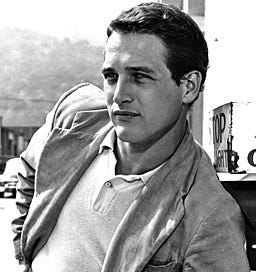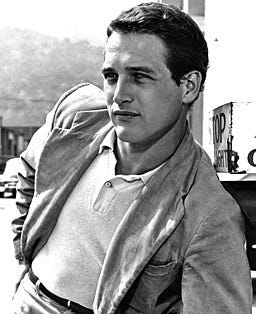Ethan Hawke’s docuseries about Paul Newman and Joanne Woodward had the undoubtedly intended effect of sparking my interest in the Newman and Woodward filmographies. To be honest, even though I’ve spent most of my life in a household where Paul Newman always held court somewhat or another, whether he was on the screen or the salad dressing, he was such a favorite with a particular boyfriend of my mother’s that I suppose I got into the habit of taking him for granted. Yet The Last Movie Stars (2022) succeeded in kindling in me a fresh interest and perspective on the man’s life and work, in short a process of appreciating him in a way that is my own rather than someone else’s. It helps that the HBO Max documentary goes back to the beginning, showing the young, chiseled, square-jawed and blue-eyed god in all his glory. I went to the Prime Video app and typed Paul Newman in the search. Delighted to see that something called the “Paul Newman Trilogy” is part of my student-discounted subscription, I started watching Episode 1.
Well before Newman did Cat on a Hot Tin Roof with Elizabeth Taylor, the aspiring movie star starred in a Big Tobacco-sponsored anthology series for CBS titled, Appointment with Adventure. “Your host is Kent Cigarettes, the only cigarette that gives you the protection of the micronite filter.”
The movie begins with a shaky, of course black and white, and fast-moving picture—an old timey car is speeding along a dusty road. We’re in the American midwest, caught up in a horrendous windstorm. Two guys stumble into a trucker diner—the Paradise Diner." One is Paul Newman. They are young, 20 or so, and they are somewhat giddy from the adrenaline rush of outrunning the wind. Each has a suitcase; each throws it to the floor. Paul Newman shuts the door to keep the wind from following them inside. The man working the counter looks up to watch them come inside. Newman, playing Mack, leans on the jukebox, completely winded. “New York was never like this,” says Jeff Harris, playing Danny, Mack’s friend.
The five in judgement are the five people they encounter in the Paradise Diner—first, the man at the counter, Bill, who we learn would love to get out of dodge and do something more interesting than serve scrambled eggs and coffee to local farmers and traveling salesmen; second, a curt traveling salesman who wants nothing to do with chauffeuring bums; and two farmers, Paul and Roy, anxious about their crops but stuck in the diner until the weather settles down; and the waitress, Sally, who might be Bill’s wife. Sally is the only one who does not immediately judge Mack and Danny. Danny flirts with her in harmless, sweet way and, though she is far from receptive to it, she is docile and courteous. Mack and Danny are ambitious college boys. Mack is obviously the more mature of the two. He frequently has to hold Danny back, implore him to be cool and not ruffle feathers among clientele already prejudiced against them. They are passing through and need a ride out west—to California, where an aunt promises to give them work and shelter while they pursue a college education. Mack tries to charm the traveling salesman into giving them a ride, since he is going in the same direction, but the salesman wants nothing to do with the pair, whom he regards with disdain and mockery. Danny wants to play music on the jukebox, but Bill, also hostile to the strangers, turns it off and sharply tells them that they are all listening to the radio in order to keep tabs on the storm. From the radio, we learn of the death of local woman Roberta Ferguson, last seen with two strangers loosely fitting the description of Mack and Danny. Prejudice rules the day, as Roy, already anxious about his farm, and Bill, suspicious of their out-of-town ways and jealous of Sally’s sympathy for the strangers, unite to take matters into their own hands. The salesman encourages raw emotion to escalate with his insinuating manner. The elderly farmer, Paul, tries unsuccessfully to talk Roy and Bill into letting Sheriff Williams handle it. But Bill and Roy have already convinced themselves that vigilante justice is the only way.
Mack lets out his feelings while tied up next to Danny:
“Boy, you can’t get get a break. You try to get outta the slums, try to make something outta yourself, and what do you get? You tell ‘em you’re goin’ to college, they laugh. Sure, so you’re right back where you started from. Just a bum.”
Danny pleads with Sally to know that they are innocent. Mack asks her if there’s any chance of getting the sheriff on the phone. Sally calls the operator and learns that Sheriff Williams has arrested person he believes to be guilty. Sally springs into action, no longer docile. She is the voice of reason, but no one listens to her. Bill and Roy are ready to torture and hang them. Paul, the elderly farmer, makes feeble attempts to talk Roy out of doing something barbaric. The salesman is a coward. Having instigated the situation, he now takes the position that what happens in this town is not his problem.
It is not a masterpiece, but it does show the danger of letting base human emotions obscure law and reason. It ends with a death (not of Mack or Danny) that only happens because human ego goes unchecked. Roy, the angry farmer, seems unlikely to submit to self-reflection. His anger just finds new justifications. He’s angry at the storm for ruining his crops, then he’s angry at the strangers, guilty of murder or not—just for being strangers, and just a couple of bums. The salesman’s ego looks like self-righteousness; then, proven wrong, he cowardly slinks out of the diner with his tail between his legs.
CREDITS
Television Play: Douglas Taylor
Sets: Larry Eggleton
Music: Ralph Wilkinson
Associate Producer: Murray Susskind
Technical Direction: Frank Protzman
Lighting: Ralph Holmes
Set Decoration: Ted Ralph
Costumes: Monte Streitfield
Executive Producer: David Susskind
Producer/Director: Robert Stevens
CAST
Paul Newman (Mack)
Henry Hull (Paul)
Frank McHugh (Salesman)
James Gregory (Roy)
Jack Lord (Bill)
Jeff Harris (Danny)
Pat Breslin (Sally)
Frank Overton (Jack)




